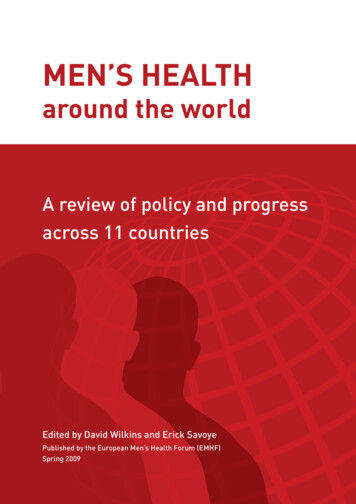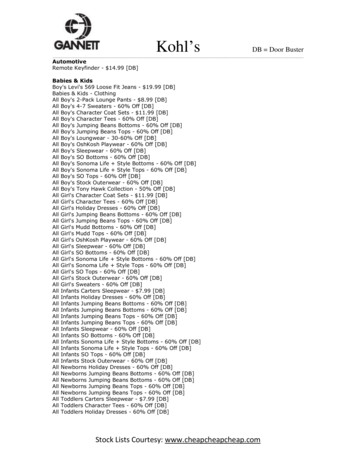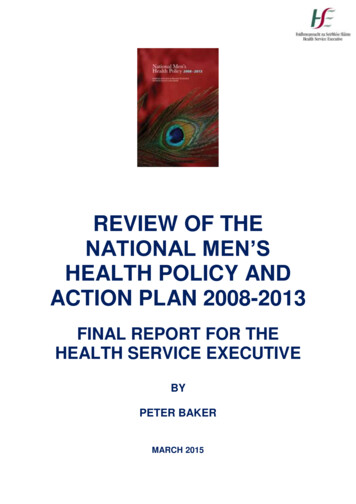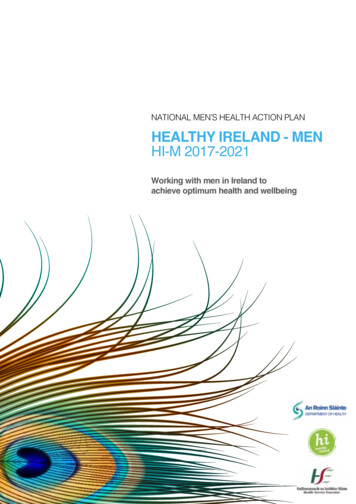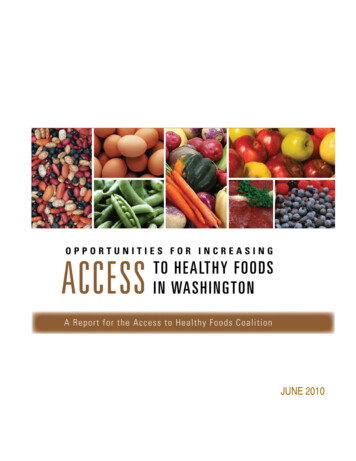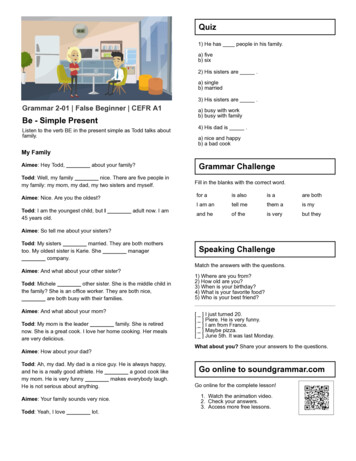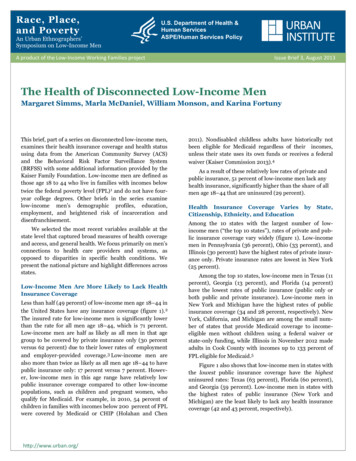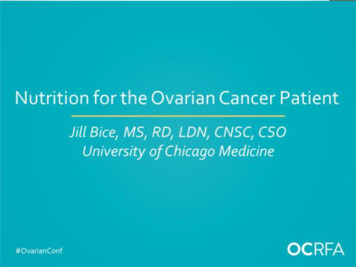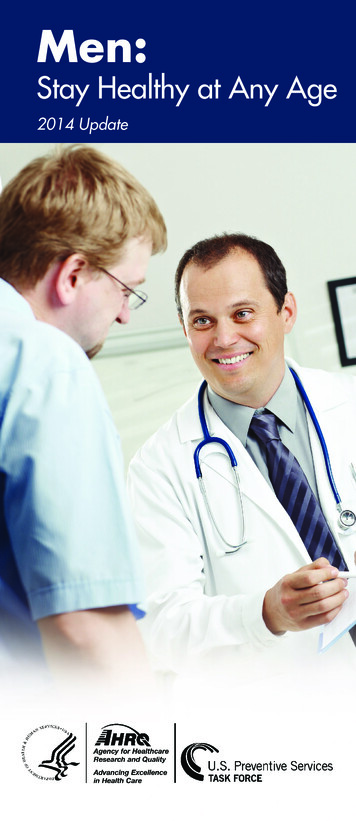
Transcription
Men:Stay Healthy at Any Age2014 Update
Use this information to help you stayhealthy at any age. Learn whichscreening tests you need and whento get them, which medicines mayprevent diseases, and steps you cantake for good health.Get the Screenings You NeedScreenings are tests that look for diseasesbefore you have symptoms. Blood pressurechecks and tests for high blood cholesterolare examples of screenings.You can get some screenings, such as bloodpressure readings, in your doctor’s office.Others, such as colonoscopy, a test for coloncancer, need special equipment, so you mayneed to go to a different office.After a screening test, ask when you will seethe results and who you should talk to aboutthem.Abdominal Aortic Aneurysm. If you arebetween the ages of 65 and 75 and have everbeen a smoker, (smoked 100 or morecigarettes in your lifetime) get screened oncefor abdominal aortic aneurysm (AAA). AAAis a bulging in your abdominal aorta, yourlargest artery. An AAA may burst, which cancause dangerous bleeding and death.An ultrasound, a painless procedure inwhich you lie on a table while a technicianslides a medical device over your abdomen,will show whether an aneurysm is present.Colon Cancer. If you are between the agesof 50 and 75, get a screening test forcolorectal cancer. Several different tests –for example a stool test or a colonoscopy—can detect this cancer. Your health care teamcan help you decide which is best for you. Ifyou are between the ages of 76 and 85, talkwith your doctor or nurse about whetheryou should continue to be screened.Depression. Your emotional health is asimportant as your physical health. Talk toyour doctor or nurse about being screenedfor depression, especially if during the last 2weeks: You have felt down, sad, or hopeless. You have felt little interest or pleasure indoing things.Diabetes. Get screened for diabetes (highblood sugar) if you have high blood pressureor if you take medication for high bloodpressure.Diabetes can cause problems with your heart,brain, eyes, feet, kidneys, nerves, and otherbody parts.Hepatitis C Virus (HCV). Get screened onetime for HCV infection if: You were born between 1945 and 1965. You have ever injected drugs. You received a blood transfusion before1992.If you currently are an injection drug user,you should be screened regularly.
You know your body better than anyone else. Always tell your doctor or nurse aboutany changes in your health, including your vision and hearing. Ask them aboutbeing checked for any condition you are concerned about, not just the ones here. Ifyou are wondering about diseases such as Alzheimer’s disease or skin cancer,for example, ask about them.High Blood Cholesterol. If you are 35 orolder, have your blood cholesterol checkedregularly with a blood test. High cholesterolincreases your chance of heart disease, stroke,and poor circulation. Talk to your doctor ornurse about having your cholesterol checkedstarting at age 20 if: You use tobacco. You are overweight or obese. You have diabetes or high blood pressure. You have a history of heart disease orblocked arteries. A man in your family had a heart attackbefore age 50 or a woman, before age 60.High Blood Pressure. Have your bloodpressure checked at least every 2 years. Highblood pressure can cause strokes, heart attacks,kidney and eye problems, and heart failure.HIV. If you are 65 or younger, get screened forHIV. If you are older than 65, ask your doctoror nurse whether you should be screened.Lung Cancer. Talk to your doctor or nurseabout getting screened for lung cancer if youare between the ages of 55 and 80, have a 30pack-year smoking history, and smoke now orhave quit within the past 15 years. (Yourpack-year history is the number of packs ofcigarettes smoked per day times the number ofyears you have smoked.) Know that quittingsmoking is the best thing you can do for yourhealth.Overweight and Obesity. The best way tolearn if you are overweight or obese is to findyour body mass index (BMI). You can findyour BMI by entering your height and weightinto a BMI calculator, such as the oneavailable at: tmA BMI between 18.5 and 25 indicates anormal weight. Persons with a BMI of 30 orhigher may be obese. If you are obese, talk toyour doctor or nurse about getting intensivecounseling and help with changing yourbehaviors to lose weight. Overweight andobesity can lead to diabetes and cardiovasculardisease.
Get Preventive Medicines If YouNeed ThemAspirin. If you are 45 or older, your doctor ornurse can help you decide whether taking aspirinto prevent a heart attack is right for you.Vitamin D to Avoid Falls. If you are 65 orolder and have a history of falls, mobilityproblems, or other risks for falling, ask yourdoctor about taking a vitamin D supplement tohelp reduce your chances of falling. Exercise andphysical therapy may also help.Immunizations. Get a flu shot every year. If you are 60 or older, get a shot to preventshingles. If you are 65 or older, get a pneumonia shot. Get a shot for tetanus, diphtheria, andwhooping cough. Get a tetanus booster if ithas been more than 10 years since your lastshot. Talk with your health care team aboutwhether you need other vaccinations. Youcan also find which ones you need by goingto: www.cdc.gov/vaccines/.Take Steps to Good HealthBe physically active and make healthy foodchoices. Learn how at nutrition-and-physical-activity.Get to a healthy weight and stay there.Balance the calories you take in from food anddrink with the calories you burn off by youractivities.Be tobacco free. For tips on how to quit, goto www.smokefree.gov. To talk to someoneabout how to quit, call the National Quitline:1-800-QUITNOW (784-8669).If you drink alcohol, have no more than twodrinks per day if you are 65 or younger. Ifyou are older than 65, have no more than onedrink a day. A standard drink is one 12-ouncebottle of beer or wine cooler, one 5-ounce glassof wine, or 1.5 ounces of 80-proof distilledspirits.
Get More Information on GoodHealthCheck out these Federal Government Web sites.Healthfinder.gov. Guides and tools for healthyliving, an encyclopedia of health-related topics,health news, and more. Go to: http://www.healthfinder.gov.Healthy Men. An AHRQ Web site on health formen. Go to: http://www.ahrq.gov/healthymen/.MedlinePlus. Health information fromgovernment agencies and health organizations,including a medical encyclopedia and health tools.Go to: http://medlineplus.gov/.Questions Are the Answer. Information on howto get involved in your health care by askingquestions, understanding your condition, andlearning about your options. Go to: http://www.ahrq.gov/questionsaretheanswer/.If you don’t have access to a computer, talk to yourlocal librarian about health information in thelibrary.Sources. This information is based on research from the U.S.Department of Health and Human Services and the U.S.Preventive Services Task Force (USPSTF). The USPSTF is anindependent group of national experts in prevention andevidence-based medicine. The Task Force makes recommendationsbased on rigorous reviews of the scientific evidence to help primarycare professionals and patients decide together whether apreventive service is right for a patient’s needs. Task Force membersare practicing doctors and nurses in the fields of family medicine,general internal medicine, gynecology/obstetrics, nursing,pediatrics, and preventive medicine, as well as health behaviorspecialists. AHRQ provides scientific, administrative, anddissemination support to the USPSTF. For more informationabout the USPSTF, go to:www.uspreventiveservicestaskforce.orgU.S. Department of Health and Human ServicesAgency for Healthcare Research and Qualitywww.ahrq.govAHRQ Pub. No. 14-IP006-AReplaces AHRQ Pub. No. 10-IP004-AMarch 2014
U.S. Department of Health and Human Services Agency for Healthcare Research and Quality www.ahrq.gov AHRQ Pub. No. 14-IP006-A Replaces AHRQ Pub. No. 10-IP004-A March 2014. Men: Stay Healthy at Any Age 2014 Update Use this information to help you stay healthy at any age. Learn which
